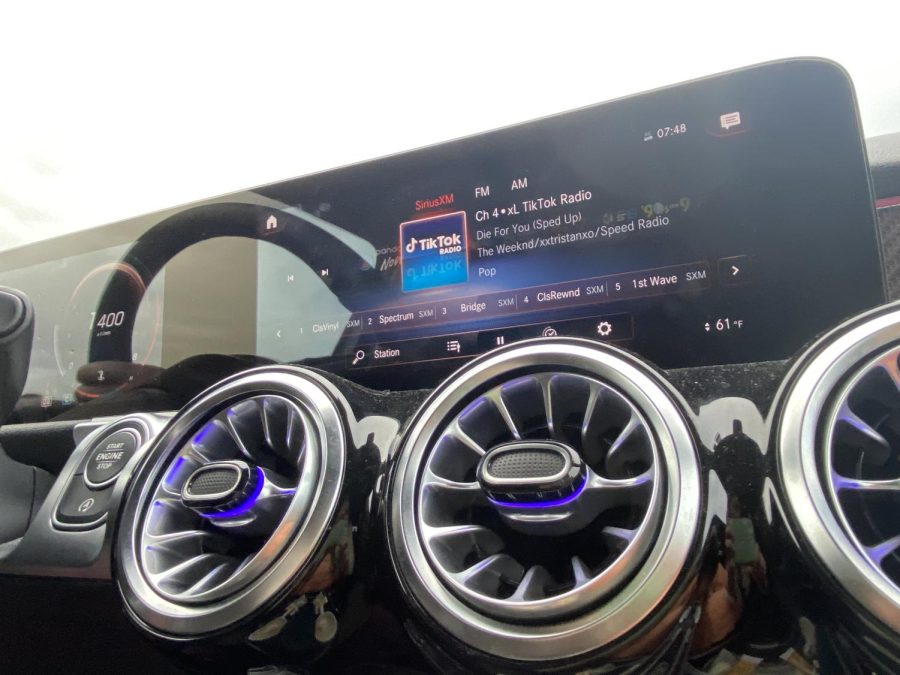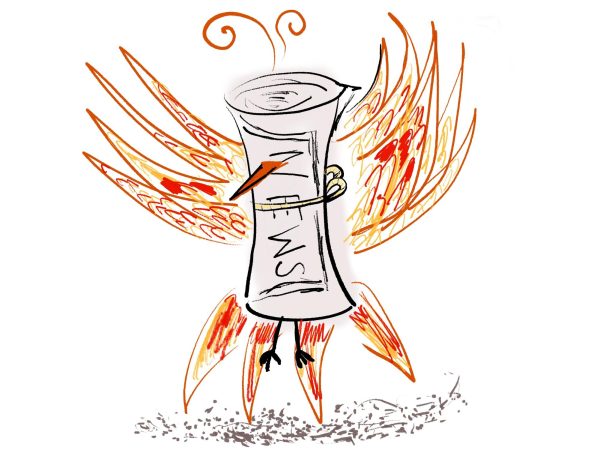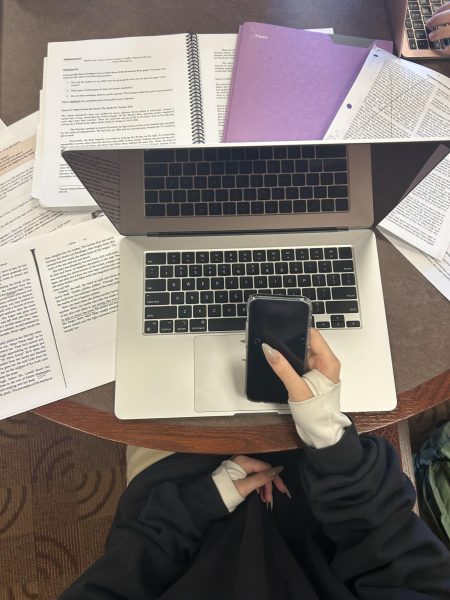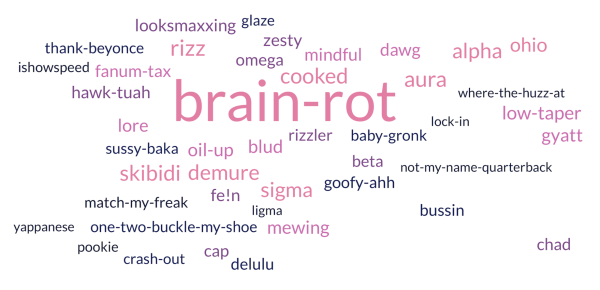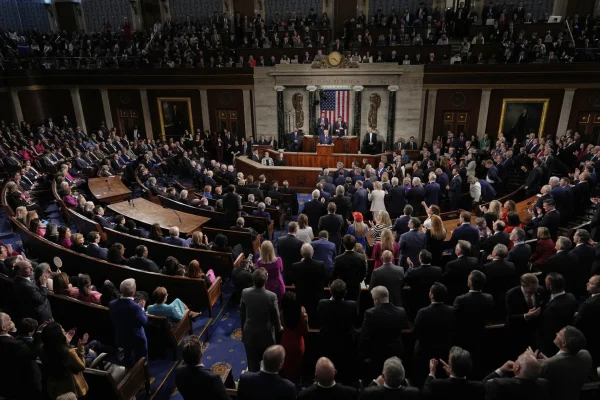Need for Speed?: TikTok’s Sped-Up Music
How TikTok has yet again impacted the music industry — this time through trend of speeding up music
Sped-up songs, a recent TikTok phenomenon, have become so popular that they are now being played on the radio. Popular stations like SiriusXM have even added a TikTok Radio station.
“Kill Bill” by SZA… (Sped Up Version). These three words in parentheses have become common additions to song names popularized by the TikTok algorithm.
With TikTok’s short videos and electrifying music that is often paired with dance trends, it is no surprise that artists speed up music to fit the fast-paced nature of the app; their profits and pockets are also benefiting from this trend.
Spotify’s sped-up songs playlist has over one million likes. This popularity is consistent with individual songs too. For example, on TikTok, the sped-up version of “Sure Thing” by Miguel was used in 3.8 million posts, contrary to its original version which was used in 39.9 thousand posts. Artists RAYE and 070 Shake’s “Escapism-Super Sped Up” and “Escapism Sped up (Official)” both have 668.6 thousand and 388 thousand posts respectively. Compared to the original’s 305.7 thousand posts, the difference is clear. The list of sped-up songs goes on.
A frequent TikTok user Joy Udinsky (‘24) has observed this trend. “It caters to a very short attention span and a lot of people have a lack of patience, so having the music sped-up gives you more of the song at a faster tempo,” she said, “You can hear more in a short amount of time.”A study released by Nature Communications found that our collective attention spans are decreasing, a trend that TikTok’s 60 second videos caters to.
Singer-Songwriter Sashi Chuckravanen (‘25) also noted this trend and agreed with Joy’s assessment. “I feel like a lot of people like shorter songs these days,” she said “I don’t have that high of an attention span, and sped-up music it both sounds a lot more interesting and it goes by faster.”
But how does amping up the tempo by turning a tiny knob on the dashboard make a song so interesting?
Using her experience as a singer-songwriter, Sashi noted that sounds “tend to mix more” when sped up. “Then, it creates new sounds you wouldn’t hear in every song,” she said, “like notes being intertwined and effects.”
Director of Instrumental Music Mr. Robert Anderson likened this type of remixing to a D.J. “D.J.s might do this to keep the energy and tempo constant from one song to the next on a dance floor,” he said.
However, although TikTok has popularized this practice, the idea of speeding up music did not originate from the app. Sped-up music has a long history within the music industry. Certain music trends such as night core (a music type from the 2000s that involved speeding up music and pairing it with high, anime-like vocals) and Chipmunk Soul, another trend from the 2000s, also experimented with sound and pitch. Kanye West’s “Through the Wire”— which was nominated for the Grammy Award for Best Rap Solo Performance — was an example of Chipmunk Soul and the general popularity of sped-up music.
So this phenomenon is not necessarily only TikTok-specific. However, the platform TikTok and social media provides for the music industry is evident from the popularity of sped-up music. Speeding up music has even revived older songs that had long been absent from peoples’ playlists. Certain dance or post trends often utilize these revived songs. The sped-up versions of Lady Gaga’s “Bloody Mary” (2011) and Mariah Carey’s “It’s a Wrap” (2009) both led to viral trends all over TikTok. They both are also songs that were brought back into the spotlight when sped-up on TikTok.
As for the future of the music industry, Sashi thinks that overall this trend could benefit many artists. “I think that it also helps because usually if you hear the sped-up version of something, you’re curious to hear what the old version was,” she said.Songs gain success faster through even quicker beats. In The Economic Times, Universal Music Group’s Global Head of A&R Strategy Nima Nasseri said that “making sped-up versions are cost-effective in comparison to a remix by some big DJ. They give higher returns and reach the people.”
However, is there a threat to artists’ profits if amateur sped-up versions are being released?
According to Audiosocket, in order to license and provide music on their platform, TikTok makes deals with record labels and other rights holders. Often, these entail TikTok paying royalties to the other party in exchange for the right to use their music. This allows artists and companies to gain profits from the popularity of their songs on the app. And, as Sashi pointed out, “the person who is speeding them up isn’t getting money for it. And if they are releasing it they have to give the name of the creator, so the creator still gets revenue.” As Lucie Ronfaut reported in the magazine Le Monde, “It is impossible on TikTok or YouTube to monetize content (meaning to receive advertising revenues) that is subject to copyright.”
Mr. Anderson weighed both sides, commenting that the exposure was a pro of using platforms like TikTok. However, “others with more of an artistic approach may not love the fact that their music loses some of its original qualities that they worked diligently to craft, altering the sound of their voice in what they may consider ridiculous ways,” he said.
But, at the moment, artists seem to view this trend as beneficial. “Karma” by Summer Walker, “Special (feat. SZA)” by Lizzo, and even “Victoria’s Secret” (which got its start on TikTok) by Jax all intentionally released sped-up versions.
There is no doubt that TikTok is now a major influence and power in the music industry. It has revolutionized the way music is now produced and marketed. Sped-up music is proof of the sway the app has over artists and their companies’ musical decisions — and the flow of music trends.

Summer is a senior and Editor-in-Chief of The Tower. This is her fourth year on the staff and third on the editorial team, previously serving as a story...


